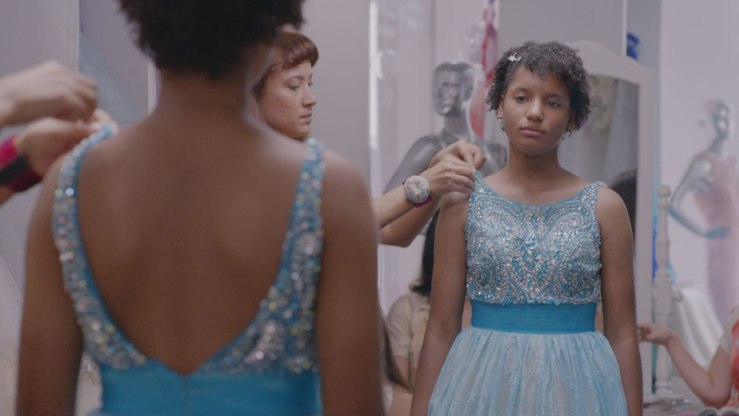In Latin America, there is no event more important for young girls than the quinceañera. Families will save up every extra penny to make sure that the celebration is a lavish affair, welcoming the girl’s progression into adulthood with a whole lot of pomp and circumstance. For Miriam (Dulce Esther Rodríguez Castillo), however, her 15th birthday is loaded with dread, as she has a secret that she doesn’t want the rest of her family to know about.
She has a boyfriend named Jean-Louis, who she only knows from chatting online. One day, she goes to meet him at a natural history museum, but upon seeing his face, something holds her back. She doesn’t talk to him, and runs away, explaining to her mom that he didn’t turn up. At first, this seems like natural shyness, but it slowly becomes clear that it’s because he’s black. The resulting film is a piercing tale that functioned both as a well-worked character drama and a seething critique of a racist society.
Miriam is the biracial child of a white mother (Pachy Méndez) and a black father, divorced, born in a country where racial discrimination is commonplace. White people in the Dominican Republic pride themselves on their Spanish heritage and speak openly about “fixing the race” — referring to the practice of a black person mixing with a white person. While the Caribbean remains one of the most racially diverse regions in the planet, it doesn’t mean that life is harmonious. There is a paradoxical nature to proceedings. Miriam’s mother loves her, and used to be married to a black man, yet she still longs for her daughter to be with a white man, as this will be seen as more respectable among society, including her own racist family. These kinds of paradoxes may seem bizarre to British audiences, but for Dominicans, there is a sense that this is simply how life is. By linking these contradictions to the problems of one girl, the film creates a metaphor explaining an entire world.

There is a strong tradition in the Dominican quinceañera that the girl does a dance with her partner to get the party started. With everybody expecting a blonde white boy with blue eyes to turn up, Miriam has to keep up an elaborate set of lies in order to explain why he isn’t coming. First, he’s sick, then she “forgets” to invite him, then he simply “doesn’t have a phone”. These excuses are delivered weakly, as the poor Miriam feels stuck, having developed real feelings for Jean-Louis but knowing that this relationship can never truly happen. First-time actress Dulce Rodríguez does a great job here in the main role, able to embody this sense of being torn in two places through mere gesture alone. She is a great find.
The end result is a coming-of-age story in which bitter truths are learned, as Miriam opens her eyes to the entrenched nature of prejudice. Considering the tropes of the genres, it would have been easy to have ended this film on a clichéd Hollywood-style note, where racial prejudice is overcome and Romeo and Juliet get together by the end. But Miriam Lies has something far deeper in mind. The conclusion may not be pretty to watch, but it feels honest, rudely awakening Miriam to the way things are. Hope is found in her white friend Jennifer (Carolina Rohana), who doesn’t judge her for how she feels, because she is a teenager too.
The movie is written and directed by husband and wife duo Natalia Cabral and Oriol Estrada, who are an interracial couple themselves, lending the story a true ring of authenticity. Together they have crafted a harsh yet empathetic movie, asking hard questions about the way Dominican society has prided whiteness above everything else. By focusing on the specifics of one country, Cabral and Estrada have crafted a universally relatable tale that is heartbreaking to watch, but necessary to see.

